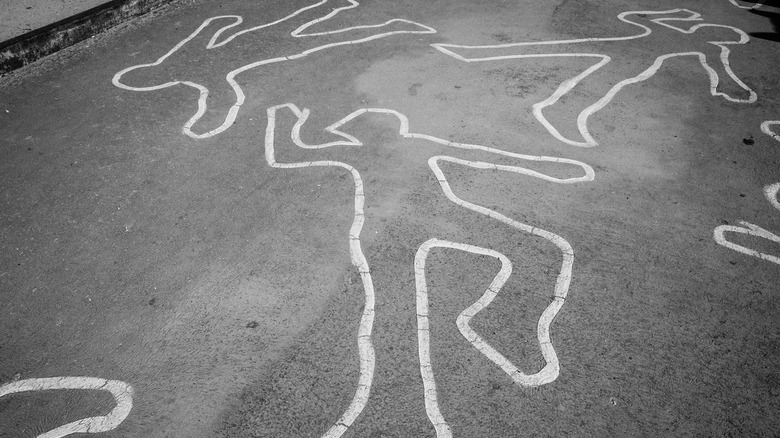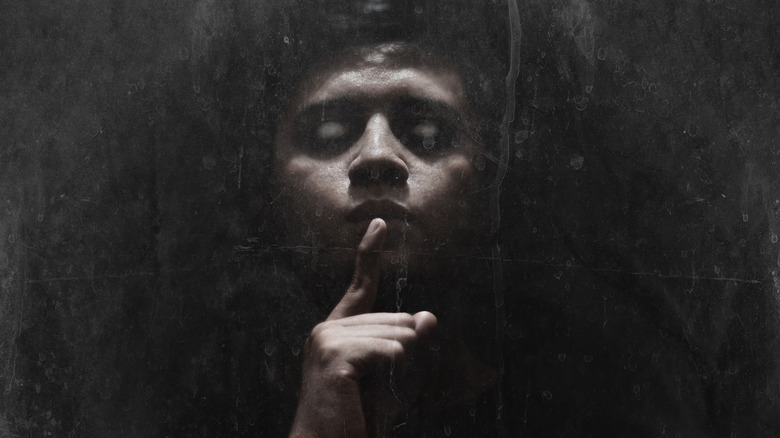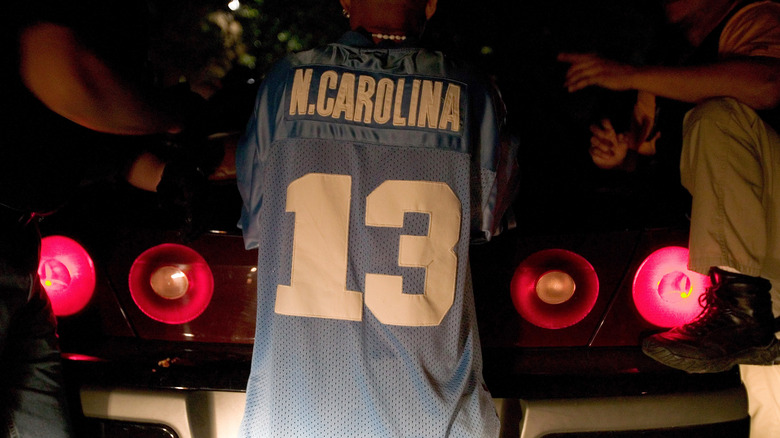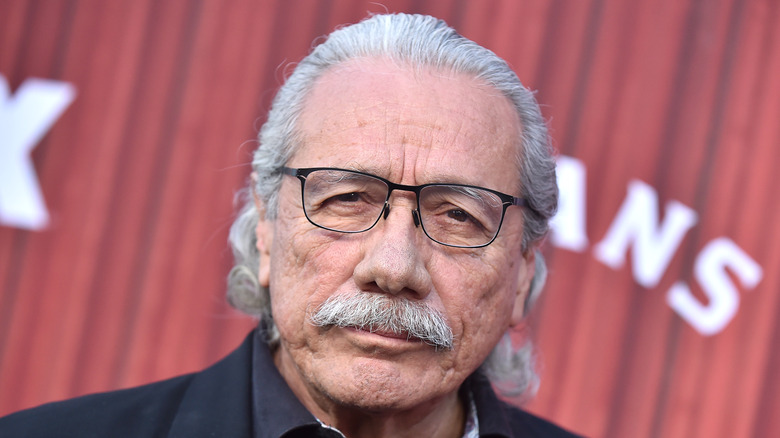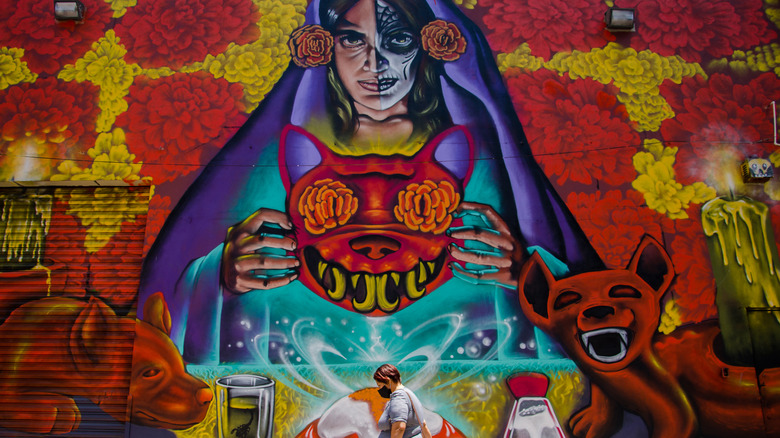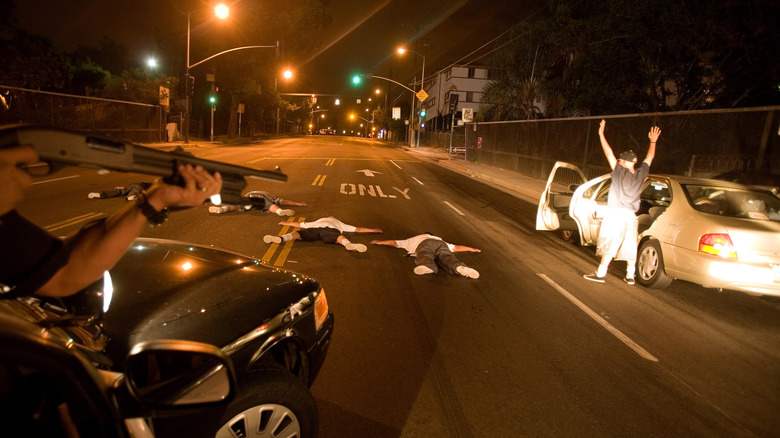Rules The Mexican Mafia Have To Follow
We may receive a commission on purchases made from links.
According to the FBI, the Mexican Mafia was formed around Mexican-American convicts and ex-convicts who operated in the neighborhoods of East Los Angeles. Evolving from an average prison gang into a highly organized crime institution at the Deuel Vocational Institution in northern California in the 1950s, the power of the group also known as La Eme and La eMe grew rapidly over the years. Its influence spread out to prisons all over the U.S., profiting from narcotics, and soon controlling all the major lines of drug trafficking into Californian and other prisons.
The group operates through a sophisticated system of hierarchy and code of rules. The main appeal of the group is in protection over its members, as revealed by a former member, Rene Enriquez, who told NPR: "Because the Mexican mafia has such influence within the prisons and the jails, that street gang member knows, 'If I don't do what I'm told to do on the streets, that when I hit the jail, or when I hit the prisons, there are those who are so loyal to the Mexican mafia that they're going to assault me."
Formed by members with a strict Latino heritage, the group's initial intention was in part to pay respect to their Aztec and Mayan heritage, seeing themselves as warriors fighting the battle started 600 years ago by white European colonists. Besides Aztec and Mayan symbolism, the gang is also known by a black hand symbol and the number 13 (via JRIC). Here are the rules that members of the Mexican Mafia have to follow.
The Mexican Mafia has a strict hierarchy
According to professor of criminal justice Robert S. Fong (via Inside Prison), the Mexican Mafia operates within a strict hierarchical system. It's organized into a complete paramilitary structure of generals, captains, lieutenants, sergeants, soldiers or "carnales." There is also a president and a vice president on the top of the pecking order, as well as other associates, who are not full members. There is one general per one prison system. This general names a committee of lieutenants and captains, who command prison units under their jurisdiction. The position within this hierarchy is not lost by moving to another prison unit. All member positions (excluding sergeants) are voted, with one vote per one member, and decisions must be made unanimously.
As reported by gang expert Tony Rafael to the Southern Poverty Law Center, the group doesn't give people much option of whether they want to join it or not. It operates through "vertical integration," meaning that it seizes any potential member as soon as they land in prison. New recruits are given the "X Files," the rule book of the group, and they must obey requests and orders or risk finding themselves on the hit list. Duties might mean staying up all night to guard the cell or transferring the messages between members, and there is no nice way out of it.
There are thought to be around 150 to 300 members of the Mexican Mafia inside the prison system who operate as generals and colonels. Although the structure is very rigid, it is believed there is currently no one main leader of the whole group.
Membership is for life
As per Robert S. Fong in "The Organizational Structure of Prison Gangs" (via Inside Prison), the group only recruits people who have a previous connection with one or more of its members. Next, the person goes through a background check (to search for any possible connections with law enforcement or informants), and after that the group unanimously votes on his acceptance. When you are in, the membership lasts for life.
Soldiers –- new recruits — have to be sponsored by another member, meaning they work under their responsibility until they progress in ranks. The sponsor is completely responsible for a recruit's behavior, and if the latter fails, they are responsible for their punishment (elimination) as well, according to Fong.
The Mexican Mafia, as many other gangs, firmly abides by the "Blood in, blood out," rule. This means that to join the group, one must undergo beating from other members, or beat a non-member, and that the only way of getting out of the group is by dying. The only people who can surpass the rule of leaving the group by death are prison guards who cooperate with the group through helping them with their illegal activities –- they can leave the group simply by leaving their job at the Department of Corrections.
Members must have dedication to the goals of the group
To prove their loyalty to the Mexican Mafia, members must often undergo a loyalty test. This means committing a crime, whether that is stealing something, committing fraud, or murdering someone. When La eMe gives an order, it must be completed. Potential members, called the "wrecking crew," who finish the deadly requests without flinching, gain respect and the trust of the established members, as revealed in "The Black Hand." Former member Rene "Boxer" Enriquez said, "It's an accomplishment. You feel a raw sense of power, inflicting violence on someone for the organization. You did it and got away with it, and you're pumped with adrenaline, you're just like, yeah! yeah!" Violent acts serve as a badge of honor and a status mobility system, the more you are willing to risk for the group, higher ranks you can occupy.
As per the Orange County Register, the main activities of the group are earning profit through the illegal business of drug trafficking (mostly heroin), gambling, debt collection, extortion, and smuggling inside the prison system, including at the most guarded prisons such as Folsom and Pelican Bay. According to gang specialist Leo Duarte (via the Orange County Register), any reluctance towards the tasks given by the group is seen as a sign of weakness. They also look for people who are proactive and who will be able to give orders in the future, "a person that doesn't say no."
Break the rules and you will be punished
Southern Poverty Law Center reports that the inclusivity of the group is strongly tied to obeying the rules, with gang expert Tony Rafael saying "If they want to remain a part of that culture, and if they want to be under the Mexican Mafia's protection, they have to obey the Mexican Mafia's rules and follow their orders, inside and outside the penal system." Or as per the Mexican Mafia's rule book, "Any member of Mexikanemi, no matter if he be president, vice president, general, captain, lieutenant, sergeant or soldier, who violates the rules of Mexikanemi must pay and suffer the consequences." (via Inside Prison).
If a member wants to resign from his position as a Mexican Mafia member, the consequences are dire. There is an automatic "green light" for killing any member who left the gang, which never goes off, not even after many years. According to the FBI, an incarcerated group member who wants to leave the group has no other option than to fight the Mexican Mafia or seek protective custody during his time in prison. When authorities are notified that a certain individual has become a target, they offer physical and mental support in exchange for "assistance in neutralizing the efforts of the Mexican Mafia."
Members must not harm a fellow member
As explained in "The Black Hand," no one is allowed to raise a hand against a fellow member without prior consultation with others. The reason for this is to avoid personal conflicts and conspiracies against group members. However, this doesn't mean that all members are safe from each other.
As reported by the Los Angeles Times, Mexican Mafia member Samuel Villalba was killed in early 2021 by fellow group members. During his time in prison between 1995 and 2009, he attacked James "Rube" Soto, a member of a higher rank, which led him to fall out of La eMe's favour. After being beaten up in prison facilities, he left the institution with a death warrant on him. Years later, he made a mistake of returning to one of the neighborhoods under Mexican Mafia command. Another former member, Ramon "Mundo" Mendoza said before Villalba's death that "The guy is an open target. It's what you'd call an open contract, a lifetime contract." (via the Los Angeles Times).
As per Robert S. Fong (via Inside Prison), the expression "bringing down the light" indicates a murder contract on someone from the group, but such an action has to be approved by a minimum of three other members.
Members must not become informants
If a member of the Mexican Mafia discloses information to law enforcement, they become informants. Informants mostly operate out of a desire to bargain away their punishment, since the legal system often rewards information with a milder penalty. But becoming an informant is absolutely banned in the Mexican Mafia, which "The Green Light" reports has "an unwavering position regarding those who become informants."
However, things can get complicated, with some people working both sides. As reported by the Orange County Register, police detective John Saro Balian started to associate himself with the Mexican Mafia instead of fighting against them. Accused of disclosing information about federal racketeering, sending warnings about arranged drug searches, disposing firearms and even extortion operations, the detective's activity was exposed through a gang member who turned informant. The Los Angeles Times reports that Balian was sentenced to 21 months in prison for obstruction and bribery charges.
The no informing rule even goes as far as consulting for movies, as in the case of "American Me." Movie director Edward James Olmos (pictured) made "American Me," which depicted Mexican Mafia members Joe Morgan and Rudy Cadena in the early 1990s. Due to an incorrect portrayal of Joe Morgan, a killing contract was issued on the director, as well as Charles "Charlie Brown" Manriquez, the member who advised the film crew on the screenplay. Ten days after the movie release, Manriquez was dead. Less than two months later gang counselor and consultant Ana Lizarraga was killed as well, and so was Manuel Luna, a third consultant (via Gangster Report).
Members must respect other members' families
Respect is highly valued among the Mexican Mafia's members, and any sign of disrespect can lead to a fight. As explained in "The Black Hand," family values are high on the list of the group members' priorities, and families should stay out of conflicts at any costs. But this rule is more often only on paper and not in practice. Rene "Boxer" Enriquez (via "The Black Hand") recollects Flo, a sister-in-law of the group founder, disrespecting him and trying to put him on a hit list. Pleading revenge, Enriquez went after her son, willing to endanger his girlfriend's sister in the process. Both of them miraculously survived, but Flo had to pay in spoons of heroin and tax.
Besides traditional insults and physical attacks, it's also a rule that no member should have sex with the wife or a girlfriend of a fellow member.
Despite these rules, violent conflicts have emerged among the members, leading to death threats to members' families. NPR quotes Enriquez as reflecting on such violence, saying "This arbitrary targeting of families — because I am your adversary — takes it to a whole different realm of violence. This was not part of the bargain. This is not the Mexican mafia that I joined."
Members must respect other members' business deals
According to "The Black Hand," a member of the Mexican Mafia must never reveal another member's business connections, which are often a main tool for a successful deal. All the business done under the jurisdiction of the Mexican Mafia must stay inside of the group. On top of that, members must not steal from fellow members and must not "politicize or create conflict within the group."
The Orange County Register reports that gang member Luis Vega was accused of "ordering a murder and direct assaults against those who showed disrespect or didn't obey the rules." These rules are not just those in the Mexican Mafia members' rule book, but also codes of behavior around conducting business for anyone who happens to be in prison. In this case, one of the rules was a "thirds" tax, signifying a huge advantage the Mexican Mafia had over anyone else –- drugs smuggled into prison by the group had to be sold first, and a third of any other contraband was given to the group. The group collected taxes even from purchases in the prison commissary.
Members must not be cowardly
"The Black Hand" reports that if you want to be a member of the Mexican Mafia, you must not be a coward. Members must strive towards aggressive and arrogant behavior, and that is how they gain respect in the community.
But this rule has led to a racial war in recent years. According to a 2007 article from the Southern Poverty Law Center, although the Mexican Mafia was founded as a protection group for Latino gang members, the group developed a deep conflict with the Black Guerrilla Family, a rival gang supporting the Afro-American community. This conflict has transformed into a horrible racial battle over the years, where people are killed solely on the basis of their skin color. To earn "stripes" or badges of honor, Mexican Mafia soldiers often kill innocent Afro-American civilians that come into Los Angeles neighborhoods under their jurisdiction, as well as any Black gang members.
The Mexican Mafia is strongly against homosexuality
According to the rules outlined in "The Black Hand," members of the Mexican Mafia must not, under any circumstances, participate in homosexual activity. The severity of this rule was displayed in the case of "American Me," a film starring Danny Trejo that led to several murders.
The movie was based on a true story and drew inspiration from real life gangsters, such as Rodolfo "Cheyenne" Cadena, Roberto "Robot" Salas, and Joe "Pegleg" Morgan. Director Edward James Olmos claimed that he got permission from Morgan before making the movie, which was denied by Morgan (via Cinemaholic).
While the movie's main topic was the machismo that gang members display, the scene that provoked such a violent reaction from the Mexican Mafia was a male rape scene -– the mafia character, who was based on Morgan, was depicted as someone who enjoyed observing a rape of a prisoner so much that he reached sexual pleasure himself, as per Jump Cut. According to Gangster Report, the gang was so displeased with this scene that it ordered the killings of Olmos and the Mexican Mafia members who advised on the film. Olmos has survived so far, but the project resulted in the deaths of several other people.
The Mexican Mafia has a code of silence
"The Black Hand" explains that no member can ever speak about the Mexican Mafia's activities or even confirm the group's existence. There is a secret bond of trust that binds the members, and one should never ask about the group, without a prior invitation. You never search for the group; the group finds you instead.
But, according to the Orange County Register, this code of silence was much stricter in the past. During its first decades, the group worked hard to remain invisible, and older members firmly followed the rule of secrecy. There was a rise in recruits after 1995, and the new members became much more carefree when it came to showing their association with the group. Tattoos became larger and more visible, while before they were often hidden under clothing.
To keep the secrecy, members often use Nahuatl, the ancient language of the Aztecs. Since the language is a complex combination of signs that can serve as letters as well as symbols, it serves well to conceal meaning (via Southern Poverty Law Center).
C-Span explains that this code of silence includes the general public as well, especially those who are experts on the matter, like Tony Rafael. Rafael said, "There is a reason why no one is talking about it and it's because of the intimidation and the threats. When you come out and write about something that hasn't been discussed, it's very powerful. You've got to worry about threats on your life, your family."
The Mexican Mafia comes before anything else
The Mexican Mafia must be the most important thing in a member's life, and they must prioritize its needs and values above anything else. There is nothing, not even a person's family, that could replace the group or come before it. Tony Rafael told the San Diego Union Tribune, "When you click up with a gang that's loyal to the Mexican Mafia, the Mexican Mafia comes before God, your family, and your friends going all the way back to childhood."
The value system, in which the Mexican Mafia rules are ingrained, becomes an important part of identity for its members, which is hard to let go. As Rene "Boxer" Enriquez describes in "The Black Hand," leaving the gang was the hardest thing he ever did, as he felt the organization rejected him: "It's a terrible feeling to be ostracized from a community that is already ostracized from society itself."
It's this sense of identity with the community, along with a strict internal regulation of behavior that has made the group so powerful. As reported by the Orange County Register in 2018, prosecutors stated that the group has become a highly sophisticated organization through the years: "These Mexican Mafia members and associates, working together to control criminal activity within (LA County jails), have become their own entity or enterprise and effectively function as an illegal government." Or as stated by Paul Delacourt, a member of the FBI's field office in Los Angeles told the newspaper, "Essentially, the Mexican Mafia is a gang of gangs."


